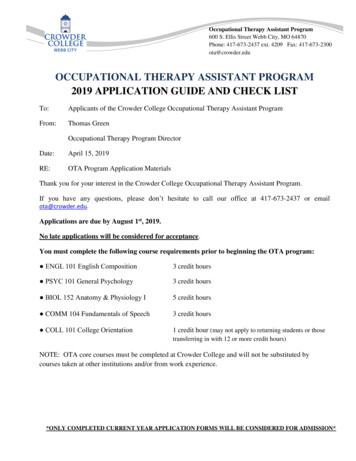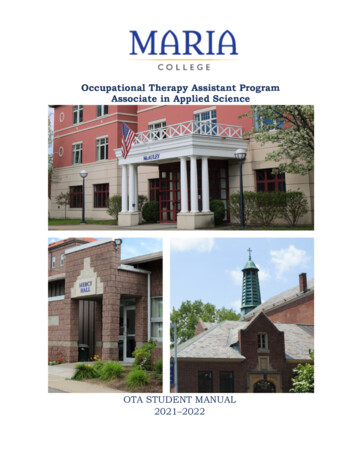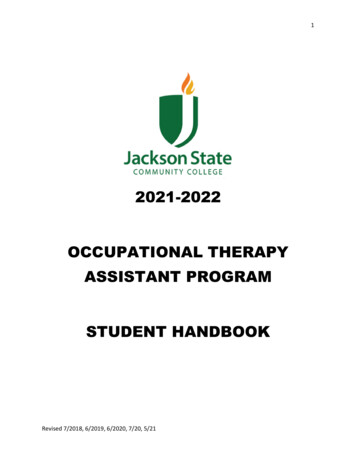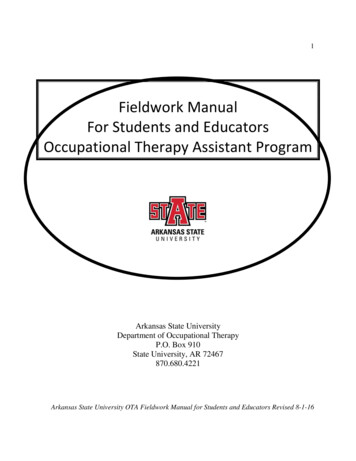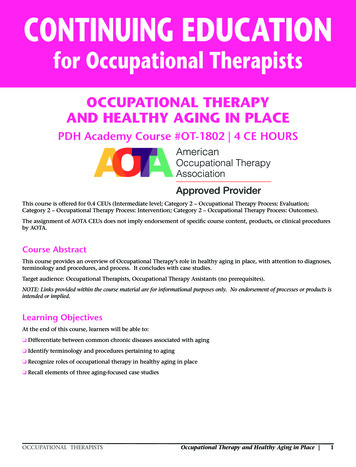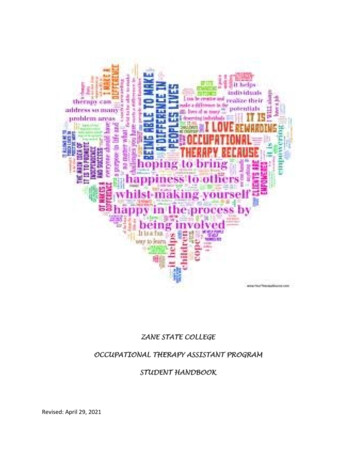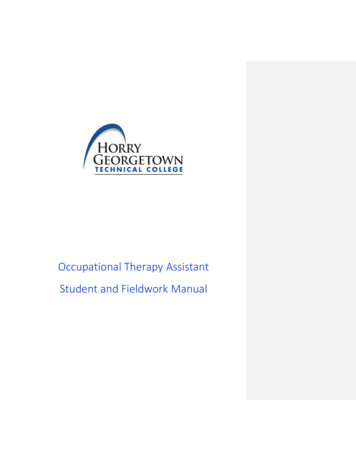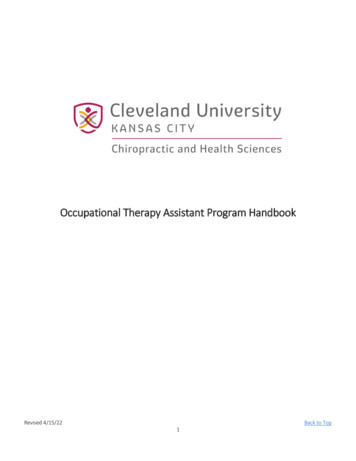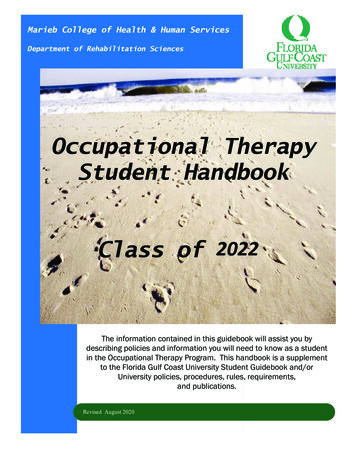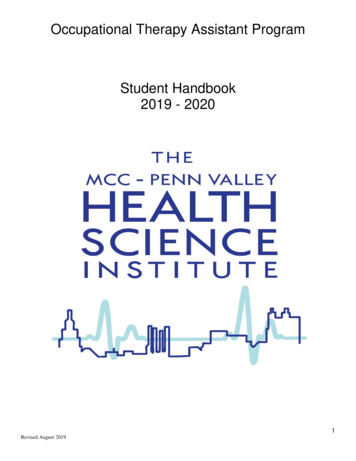
Transcription
Occupational Therapy Assistant ProgramStudent Handbook2019 - 20201Revised August 2019
METROPOLITAN COMMUNITY COLLEGE – PENN VALLEY-HEALTH SCIENCE INSTITUTEOccupational Therapy Assistant ProgramStudent HandbookWelcome!Congratulations on your admittance into the Occupational Therapy Assistant program. OccupationalTherapy is an exciting field with diverse opportunities. This handbook is designed to give you anoverview and description of the program. You will want to reference the materials included in thehandbook throughout the program. This handbook does not replace the college student handbook. Theinformation contained in both handbooks applies to the program.FacultyAmber Jenkins, MLS, OTR/LProgram CoordinatorHSI 410J816-604-4235816-759-4646 (fax)amber.jenkins@mcckc.eduLisa Koch, MOT, OTR/LAcademic Fieldwork CoordinatorHSI 410D816-604-4463816-759-4646 (fax)elisabeth.koch@mcckc.eduAll policies are subject to change. Students are held responsible for all policies in the current handbookavailable on-line.2Revised August 2019
ATTITUDE“The longer I live, the more I realize the impact of attitude on life.Attitude, to me, is more important than the past, than education, thanmoney, than circumstance, than successes, than what other people think,say, or do. It is more important than appearance, giftedness, or skill. Itwill make or break a company, a church, a home. The remarkable thingis we have a choice everyday regarding the attitude we will embrace forthat day. We cannot change the inevitable. The only thing we can do isplay on the one string we have, and that is our attitude. I am convincedthat life is 10% what happens to me and 90% how I react to it. And so itis with you, we are in charge of our attitudes.”Charles Swindoll“Keep your thoughts positive because your thoughts become your words. Keepyour words positive because your words become your behavior. Keep yourbehavior positive because your behavior becomes your habits. Keep your habitspositive because your habits become your values. Keep your values positivebecause your values become your destiny.”Mahatma Gandhi3Revised August 2019
OTA Handbook Table of Contents1. MCC mission, vision, creed, purpose, philosophy2. OTA program mission3. OTA program philosophy4. OTA program educational goals5. OTA program student competencies6. OTA policies and proceduresPoliciesGrading scale, academic dishonestyStudent performance, midterm performanceAttendance/tardinessHealth requirementsDrug screen, criminal background7. OTA Fieldwork ManualLevel ILevel IIFW policies/informationAttendanceFW dress codeProfessional behaviorEvaluation methods, grading scaleHIPAA guidelines related to FWFW Level II evaluationStudent FW agreement8. Appendix: FormsPhysicalPost Exposure ProcedureModel ReleaseInformed ConsentRelease of LiabilityInfectious Disease PolicyStatement of UnderstandingPages 5-6Page 7Pages 8 - 9Page 10Pages 11-12Pages 13 – 23Pages 13-16Page 16Pages 17 - 20Page 21Pages 21 – 24Pages 25Pages 26 - 39Page 27Page 27 - 28pages 28 - 32Page 32Pages 33-34Pages 34 - 36Page 36 - 38Page 38Pages 39 - 40Page 41Pages 42 - 554Revised August 2019
Metropolitan Community Colleges Mission, Vision, Scout Creed, Purpose, PhilosophyMissionPreparing students, serving communities, creating opportunities.In order to accomplish this mission, the board of trustees has empowered the chancellor, as executive officer, toimplement its policies. The chancellor, with the other officers of the District, will provide leadership in theimplementation of the mission and goals of the District.Vision StatementLearning is the focus of everything we do at Metropolitan Community College. Student learning is central toour mission; employee learning is key to our strength; and organizational learning is the foundation forinnovation and growth. Learning is a lifelong process. Learners are whole persons with intellectual, physical,emotional, spiritual, social, ethical, vocational, and economic dimensions. As learners, as facilitators oflearning, and as an organization, we accept responsibility to:-Manage learning and commit the time and energy that meaningful learning requires.-Encourage free, open, and respectful exchange of ideas as a natural part of change.-Synthesize tradition and innovation in order to enhance academic achievement.-Design and implement structures and processes that promote learning.-Draw on diversity to influence and inform learning.-Engage in continuous assessment, reflection, and adaptation.-Create a physical, social, and intellectual environment that supports learning.-Build partnerships that promote individual, institutional, and community betterment.MCC CreedAs engaged members of the MCC community, we pledge to create a safe and supportive learningenvironment. We understand that we are more successful together than apart. As we REACH for success, weagree to uphold the following standards:Respect:We respect each other, ourselves, the college, and our community. We hold ourselves to high moraland academic principles. We demonstrate this through our actions and words.Excellence:We challenge ourselves to set high standards and embrace life-long learning.Accountability:We accept responsibility for our individual actions and their impact on others. We takeownership for our learning and strive to resolve matters in a peaceful way.Community:We are part of a large and diverse society. We are engaged in building a positive college cultureof involvement, collaboration, and completion. We accept all members of the community.Honor:We are honest and truthful. We give recognition to the original ideas of others and expect recognitionfor our individual thoughts and ideas.5Revised August 2019
The following purpose statements declare how MCC will carry out the mission of the District:Purpose StatementsIn pursuit of MCC's mission, the District will:-Provide courses and associate degree programs that prepare students to transfer to four-year colleges anduniversities to complete bachelor's degrees.-Provide courses, certificates and associate degree programs to prepare students to enter the work force inskilled jobs and careers.-Provide courses, certificates and associate degree programs to assist adult workers to upgrade their job skills,change careers, or advance in their careers.-Provide instruction in core academic skills that prepare students to succeed in college-level courses andprograms.-Provide student development and support services to assist students to achieve their academic, career andpersonal goals.-Provide and support activities to enhance student learning outside the classroom.-Provide a range of services and accommodations to help all prospective students overcome barriers to accesscollege programs and opportunities-Provide courses and other educational and cultural activities to enrich the lives of members of the community.-Provide business support services and other training and assistance to support the economic development of thecommunity.-Collaborate with other educational institutions, community-based organizations, agencies, businesses andindustries to meet the needs of the community.PhilosophyThe Metropolitan Community College is dedicated to serving the educational needs of the community. Thecollege programs are intended to help students understand themselves, the society of which they are a part andthe universe in which they live.At the same time, MCC provides opportunities for students to develop occupational skills. Faculty andadministrators cooperate to create an environment that stimulates intellectual growth and nurtures academicfreedom for students and instructors alike. The programs offered are intended to encourage lifelong learning.Finally, the MCC employees are committed to providing equal opportunity for all persons regardless of age,creed, race or gender.6Revised August 2019
METROPOLITAN COMMUNITY COLLEGE – PENN VALLEYOccupational Therapy Assistant ProgramMission StatementThe Occupational Therapy Assistant Program at Metropolitan Community College is committed to serving thecommunity by providing quality education that is affordable and offers equal opportunity and accessibilitywhile embracing diversity. The program design is complementary to the colleges and the AmericanOccupational Therapy Association’s policies, procedures, and philosophical foundation. The instructionalcontent and methods will prepare the student to be competent, well-rounded, adaptable and service-mindedpractitioners who are committed to a lifelong desire to achieve personal and professional excellence. Thegraduate of the Occupation Therapy Assistant Program at Metropolitan Community College will be able topractice as a competent, entry-level Occupational Therapy Assistant under the ethical standards of theprofession and provide a necessary service to their community.Revised 1/25/20177Revised August 2019
METROPOLITAN COMMUNITY COLLEGE – PENN VALLEYOccupational Therapy Assistant ProgramPhilosophyHumans are complex beings. Humanity requires an interactive process of continuous adaptation and growth.The adaptation process is facilitated through occupation (purposeful activity) and influenced by physical, social,and cultural environments. Occupational therapy education advocates the use of occupation to facilitateadaptation. This adaptation results in a change in functional performance or context which then promotessurvival, self-actualization, and quality of life.The ability to continuously adapt to change in oneself, the environment, and one’s performance is the keycomponent to success in any situation. The occupational therapy educational process prepares practitioners tofunction effectively in the dynamic environments of a diverse and multicultural society. The instructionalformat provides learning experiences that will assist the student in the adaptation process while acquiringknowledge, skills, and behavior necessary to practice in this society. Education needs to involve the learner in acollaborative, integrated and self directed learning process to promote critical thinking, flexibility, creativity andthe desire for life-long learning. Situations are provided to challenge students to push themselves outside theconfines of their culture and class to attempt to gain an accurate understanding of their clients’ world view andlife situations. Engaging the student as an active participant using occupation in a variety of contexts withmultisensory instruction and current technology enhances learning.The OTA faculty at Metropolitan Community College believes that certain concepts are fundamental tooccupational therapy.1. All people possess worth and dignity and have an undeniable right to be respected regardless of age,gender, race, creed, social, or economic status. Each person is a unique entity with certain biopsychosocial needs whose ultimate search is for the achievement of full potential. During the life span,people proceed through a series of development stages and, within each stage, they undergo adaptivechanges. In addition, an individual is continuously modifying and being modified by his or herenvironment. The vast arrays of experiences encountered by an individual in every day life are productsof both internal and external environments. Each person is a member of society and, to functionsuccessfully within society, one will adapt by interacting and communicating with a changingenvironment based upon individual perceptions as change is an inevitable factor for living.2. Health is a dynamic word that includes the biological, psychological, and social being of an individual.Health is the optimum adaptation of the individual to the stresses of the external and the internalenvironment. Adaptation is a change in function that promotes survival and self-actualization.Disturbances in adaptation can be the cause or effect of physical, emotional or social disorders. Illness,which is a manifestation of a disease process, can disrupt health. Illness may result in various levels ofdysfunction. Dysfunction is defined as a disruption in a person’s ability to choose, organize or performa task and may occur when adaptation is impaired. To the individual, dysfunction means poor healthand a compromised state of being. Health and illness are viewed on a continuum. Health and illness arenot constant or absolute but are ever changing states of being.3. Occupational therapy is based on the belief that purposeful occupation, comprised of interpersonal andenvironmental factors, may be used to prevent and mediate dysfunction and maximize adaptation.Occupations are ordinary and familiar things people do every day, and occupations have a psychologicaldimension. Occupations include purposeful activities, and purposeful activities are goal directed8Revised August 2019
behaviors or tasks that an individual considers meaningful. Occupations are the activities and tasks thatfacilitate intrinsic motivation for each unique individual. They are the activities or tasks that anindividual likes to perform wants to perform, or has to perform in their life. Occupation as a modalityfor treatment is as diverse and complex as each individual we treat. The unique ability of the OTpractitioner is to analyze and modify activities to be meaningful and satisfying to the participant,4. Learning occurs within the individual and is activated by the learner. Learning is a developmentalprocess where growth in all domains of life may occur simultaneously. Therefore, the learner may begrowing professionally, psychologically, socially and culturally during any given educationalexperience. The learner enters the learning environment to attain goals. Progression toward goalachievement is promoted by moving from the familiar to the unfamiliar and actively involving thelearner in the learning activity. Teaching provides others with opportunities to develop knowledge andinsight, encouraging creative thinking, facilitating problem solving and developing skills. The teacherestablishes the environment conducive to learning and guides the student in securing experiences thatwill promote optimal development. Instruction should occur in a variety of environments: theclassrooms; the laboratories; and “real-life” experiences. Finally, the student has the obligation tocontribute to this learning environment by actively seeking and utilizing educational opportunities.5. Continual program evaluation is necessary to assure the effectiveness of instruction. Evaluationprovides the instructor with valuable insight to understand the overall effectiveness of the instructionaltechniques being implemented and adapt instructional methods in order to meet educational goals.Professional development by faculty is necessary to provide instruction of current OT practice and thusensuring quality education.Reviewed 1/27/20179Revised August 2019
METROPOLITAN COMMUNITY COLLEGE – PENN VALLEYOCCUPATIONAL THERAPY ASSISTANT PROGRAMEDUCATIONAL GOALS1. The OTA program faculty will prepare students for an Associate of Applied Science Degree –Occupational Therapy Assistant.2. The OTA program will prepare all graduates for employment as entry-level OccupationalTherapy Assistant practitioners as defined by the American Occupational Therapy Associationcompetent to perform Occupational Therapy services in a wide variety of settings.3. The OTA program will provide a course of study with clearly defined expectations for allstudents at all levels of the program and help each student to achieve these expectations.4. The OTA program will provide equal opportunity for all people without regard to their race,color, religion, sex, sexual orientation, age, birth, ancestery, national origin,religion, or disability.5. The OTA program will provide and promote accessibility and accommodations to thosequalified students with disabilities.6. The OTA program will enhance student awareness and appreciation of diversity within andoutside the college community.7. The OTA program will facilitate students’ integration of theory and practice by providingeffective didactic, laboratory, and fieldwork opportunities.8. The OTA program will provide multisensory, current technological classroom instruction thatsupports lifelong learning, personal/professional development, and critical thinking.9. The OTA program will instill ethical standards and attitudes in personal and professionalconduct and relationship.10. The OTA program will collaborate with community based organizations and othereducational institutions to ensure ongoing program effectiveness in instruction and forcommunity needs.10Revised August 2019
METROPOLITAN COMMUNITY COLLEGE – PENN VALLEYOCCUPATIONAL THERAPY ASSISTANT PROGRAMSTUDENT COMPETENCIESUpon completion of the OTA Program, graduates will demonstrate: knowledge of the history of Occupational Therapy and the use of occupational as a basisfor effective treatment implementation. knowledge of the role delineation between the OTR and the COTA. knowledge of the scientific basis and effectiveness of occupational therapy treatment. knowledge of AOTA’s standards and code of ethics for practice. knowledge of state and federal regulatory and legislative actions and their effect on thedelivery of OT and health care services. knowledge of universal precautions. the ability to read and interpret professional literature and critically analyze newconcepts. the ability to communicate effectively in written and oral communication. the ability to promote effective interpersonal relationships. the ability to implement occupation-based, comprehensive treatment which may includebut is not limited to:assessment of architectural barriersADLs and functional traininghigh and low assistive technologydevelopmental activitiesendurance activitiesenvironmental modificationsmodalities (OT specific)muscle re-education, strengtheningorthotic fabricationclient/family/significant other/staff educationpositioning for wheelchair and bedwellness and health maintenance11Revised August 2019
Student Competencies cont. an understanding of the importance and value of lifelong learning to promote personaland professional growth. an understanding of the principles of:authority and responsibilityplanning and time managementflexibility and problem solvingthe supervisory processperformance evaluation, policies andproceduresfiscal considerations for OTquality assuranceclient and family interactiondocumentation and confidentialitymanagement in OT12Revised August 2019
MCC-Penn ValleyOccupational Therapy Assistant ProgramPOLICIES & PROCEDURESProbation PolicyStudents may be placed on probation within the OTA program for non-academic infractions including but notlimited to clinical fieldwork. Students may also be subject to sanctions under the MCC Student Code ofConduct for the same violation. Once placed on probation, a student will remain on probation until they eithergraduate or a second incident occurs. If a second incident occurs, the student will be dismissed from theprogram as well as be accountable for the violation through the Student Code of ConductGrounds for probation during class related activities shall include, but not be limited to, the following:a.Disruptive behavior (defined as any behavior that impedes the ability of other students toparticipate in education-based activities or inhibits learning and teaching)b.Illicit activitiesc.Dishonest behavior (sharing exam information, dishonesty to instructors, etc)d.Reproduction in any form of exam/copyrighted/instructor or program intellectualmateriale.Multiple tardies (5 or more within a class, tardy is defined as 5 or more minutes late)f.Multiple absences (beyond the policy of the course)g.Violation of OTA program policiesh.Failure to complete any requirements for classes including fieldworki.Inappropriate use of social media affecting the program or clinical siteMCC Social Media Policy: p.pdfOTA Handbook page 15Grounds for probation related to clinical fieldwork include, but are not limited to, the following:a.Any grounds from aboveb.Insubordinationc.Conduct potentially detrimental to the safety of clients, clinical facilitiesstaff, college faculty or staff, or other studentsd.Unsatisfactory clinical performance as determined by college facultye.Attendance relatedf.Inappropriate, unprofessional and/or disruptive behaviorh.Failure to comply with any fieldwork related requirements - see FW HandbookIf the probation related to clinical fieldwork results in the student being removed from that fieldwork, thestudent will be dismissed from the program.A student placed on probation will be given a letter indicating the reason for probation and the ramifications ofanother incidence of probation. A meeting will be held between the faculty and program director and thestudent at that time.Dismissal: A Student can be dismissed from the OTA program for the following infractions:a.Any incidence of cheating, including but not limited to:completion of assignments as a group rather than individual13Revised August 2019
b.c.d.e.f.g.h.more than one incidence of plagiarismsharing of test questions by any formcopying assignments or test answersFailure of any fieldwork courseObtaining less than a ‘C’ in any courseMore than one incidence of probationOther reasons as determined by facultyViolation of MCC Student Code of ConductRepeated incidence of insubordinationEthical or legal violation(s)Additional PoliciesCompletionIn order to receive an AAS degree in Occupational Therapy the student must complete all courses with a gradeof “C” or better in each course required for the degree and must successfully pass all laboratory checkouts asoutlined in each course syllabus. As well, students are expected to maintain a GPA of at least a 2.0 in theprogram. Progression through coursework is outlined in the curriculum sequence outlined in the courseinformation packet with no opportunity to complete OTA courses in variation of the sequence. Students failingto meet these requirements will be required to reapply to the Occupational Therapy Assistant (OTA) program,and if accepted, retake all OTHA courses in sequence beginning with semester 1 offerings.The OTA student will follow guidelines set forth in individual course syllabi. Evidence of academic dishonestyin any OTHA course including fieldwork may result in termination from the program. If termination from theprogram results from academic dishonesty the student may not reapply to the program.Satisfactory (S) or Unsatisfactory (U) grades will not be accepted for program prerequisite courses, OTHAcourses, or any other courses included in the degree requirements.Students who apply to the program with previous OT coursework, whether from an OTA or OT school will beevaluated on an individual basis. They may be expected to take all OTHA courses in sequence beginning withsemester one offerings.The OTA student must demonstrate personal and professional qualities such as positive attitude, appropriatejudgment, flexibility, self-confidence, resourcefulness, ethical behavior, professionalism (behavior, dress,hygiene, and communication), respect to others, personal responsibility, and tact. Documented incidents ofunprofessional behavior may result in being placed on probation.Dress CodeThe OTA student is expected to represent themselves and MCC in a professional manner both when off campusat an OTA program event and when outside speakers are presenting to the class. In these instances, students areexpected to dress professionally. No jeans (in any form), shorts, tennis shoes or t-shirts will be allowed on theseoccasions. Students are expected to wear slacks, dress shirts or collared shirts or sweaters when representingthe OTA program. Hats may not be worn on fieldwork or when guest speakers are present. Students will beasked to remove hats when taking an exam during class or lab. For fieldtrips and guest speakers, unlessotherwise noted, students are expected to dress professionally as noted above. No jeans, shorts, tennis-shoes ort-shirts.Any violation of the dress code could result in the student being asked to leave the experience and/or up to 10points deducted from the class.14Revised August 2019
RequirementsThe OTA student is required to obtain a student identification badge indicating OTA student. You will need topresent proof of current enrollment in order to obtain this badge.Students will be required to pay for document management and upload and maintain all required forms (bloodborne pathogen, universal precautions, HIPAA examinations, liability & health insurance, CPR certification,immunizations, physical examination forms, etc.) to present at the request of the program coordinator, academicfieldwork coordinator, or the clinical fieldwork supervisor.The OTA student will receive and maintain current CPR (adult, child, and infant) certification through MCC.Failure to do so will result in termination from the program. A copy of both the front and back of thecertification card must be uploaded to the document management system immediately following certification.Proof of certification is required for all fieldwork experience.Students must maintain safety in all classroom and clinical settings. Safety considerations may be outlined inthe individual course syllabi and could include limitations on footwear, use of safety equipment or other safetyconsiderations.Students are responsible for their own transportation to all educational activities including volunteer servicelearning, course related activities, and Level 1 and Level 2 fieldwork. They may be expected to drive up to 70miles each way.It is recommended that the OTA student have health insurance throughout their involvement in the OTAprogram.Metropolitan Community College (MCC) is committed to ensuring equal access to all qualified students withdisabilities in accordance with the Americans with Disabilities Act (ADA). If you have a disability which mayimpact your ability to access or participate in any aspect of my class, please contact the campus DisabilitySupport Services (DSS) Coordinator, Celia Hancock, at 604-4293 or celia.hancock@mcckc.edu. The DSSCoordinator will work with you to determine what disability documentation/information is needed in order toprovide accommodations. Accommodations are determined on an individualized basis and may take some timeto put in place, so early notification to DSS is helpful. More information is available atwww.mcckc.edu/disability.*Students testing with accommodations will need to schedule their exam either in the testing center or inthe Allied Health offices of the HSI with Terry McDaniel as close to the scheduled test date/time aspossible. Students will need to notify the instructor of the scheduled date/time prior to the exam beinggiven during the regularly scheduled class time.Social MediaIt is suggested that students of each year’s class develop their own social networking page to communicateabout course assignments, brainstorming sessions, education resources, etc. However with social networkingsites such as Facebook, Twitter, MySpace, Instagram, etc., students are prohibited from posting about OTAclinical sites and supervisors; protected patient and family information; and the OTA program without theapproval of the Program Coordinator. All students must comply with HIPAA policies. Absolutely no photoscan be posted in regard to patients or patient care. No photos of program materials, including tests may be takenor posted. Should the clinical site’s social media policy be more stringent, the student is required to comply withthe clinical site’s policy. Failure to comply with this social networking policy will result in failure of fieldworkif fieldwork related and /or dismissal from the OTA program.15Revised August 2019
Grading ScaleThe program grading scale, which is aligned with the majority of OTA programs across the country, is asfollows:A 92-100B 84-91C 75-83D 66-74F Below 66Instructors reserve the right to exercise professional judgment as to whether a student passes a coursesatisfactorily in cases where a student has borderline performance or has had documented difficulties withfieldwork.Refer to individual course syllabi for specific grading points and criteria.Passing a CourseStudents must pass all assessment components in the course to successful complete the course.Exams, when averaged, must equate to a 75% or higherAssignments, when averaged, must equate to a 75% or higherCourse average must also be 75% or higher* Students must pass all lab practical exams with 80% accuracy; as well as the grade for the lab portion must be at least an80% to pass the course. Students are allowed to retest 1 time per practical to attempt to pass. A student may not earnmore than a B (85%) on a retest. If a student fails a practical a second time, they will not be allowed to continue inthe course.* The program reserves the right to allow for exceptions to the above when evidence exists supporting studenteffort and engagement.Academic DishonestyCheating will not be tolerated. Evidence of cheating will result in termination from the program with noopportunity to reapply.Cheating is an act of deception which includes but is not limited to the following:Copying another student’s assignment to turn in as their ownLooking at another student’s examinationTaking pictures of exams at any timeCopying questions from tests when taking it or reviewing itTalking with other classmates during an examination, including practicalsProviding incorrect information regarding performance and attendance at fieldworkPlagiarism will not be tolerated and will result in a failing grade for the first occurrence and possibly, dismissalfrom the program. Additional acts of plagiarism will result in dismissal from the program. Work completed forother courses submitted for this course or work previously sub
2. OTA program mission Page 7 3. OTA program philosophy Pages 8 - 9 4. OTA program educational goals Page 10 5. OTA program student competencies Pages 11-12 6. OTA policies and procedures Pages 13 - 23 Policies Pages 13-16 Grading scale, academic dishonesty Page 16
